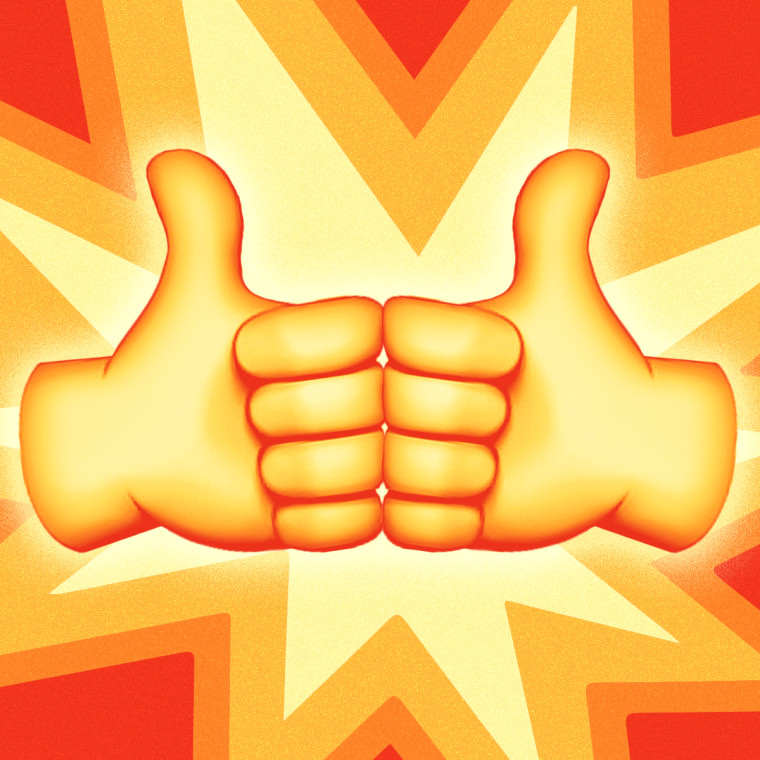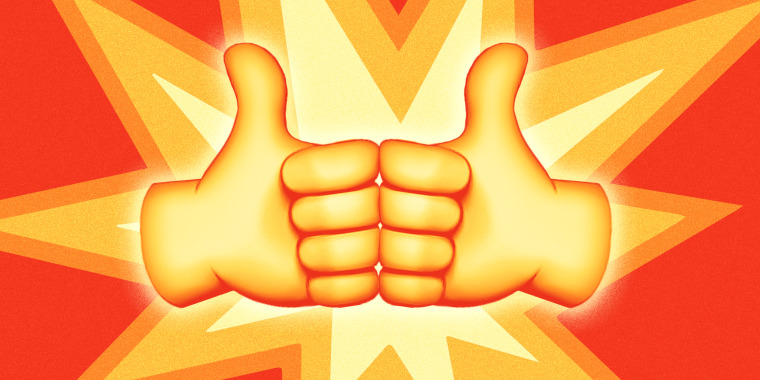👍.
In an era where technology is ever-evolving, so is our understanding of how to use it — and this includes supplemental elements, like emojis.
Something that was once thought to be a fun addition to texting or messaging has now become a highly contested topic between generations, and recent debate has spurred from one conversation on the internet pertaining to a commonly used emoji: the thumbs-up.
Several months ago, a Reddit user took to the platform to ask if anyone else felt "unsettled" by the use of the thumbs-up emoji, sharing an example of workplace messaging conversations.
"Most people at work use the ‘thumbs up’ reaction all the time," the person wrote. "I don’t use it much. I either ‘heart’ reactions or reply even if it’s a short “Great!” or “Thanks!” (I also feel like I use too many exclamation marks, but that’s a different story). Anyway, I think it’s normal to ‘thumbs up’ messages, but I still feel like it’s such an unsettling response. Does anyone else feel this way?"
This Reddit thread is an example of the rising generational debate that spans far beyond the thumbs-up emoji. Are certain emojis perceived in a context that's anything other than literal?
Short answer: Yes, depending on who — or perhaps what generation — you're asking.
Can the 'thumbs-up' emoji be seen as passive aggressive?
The original Reddit post titled, "Am I not adult enough to be comfortable with the 'thumbs up' emoji reaction?" got a shocking amount of replies from both ends of the spectrum.
"The general consensus I see with all my friends and all over the internet is that it’s way rude. Definitely had to reprogram my gut reaction to seeing the thumbs up react or reply from coworkers," one user — who didn't reveal their age but said they would ask what their 25-year-old husband thought later on — replied in the thread.
Another user replied to that comment: "What the kids do, is not what everyone else adopts. It’s not passive-aggressive at all that I’ve seen — it seems to be a younger generational thing. You guys changed the meaning for some reason."
Others expressed their support for the thumbs-up emoji. "I love it because it means many many things. It means 'I approve' or 'I understood and will obey' or 'I agree.' If anything, my only objection would be that some days it might be hard to tell which one it means. But it is generally pretty clear," one user replied.

However, many agreed with the original post and doubled down that the thumbs-up emoji can feel indirectly aggressive, particularly in a workplace setting.
"It’s not that odd to see it as passive-aggressive. Just imagine how would it feel to go into your boss’ room, say something, and then see him turn to you, look you in the eye, and go '👍'," one user replied.
Another user agreed, writing, "I understand what you mean, my last workplace had a WhatsApp chat for our team to send info to each other on and most of the people on there just replied with a 👍 I don’t know why but it seemed a little bit hostile to me, like an acknowledgment but kind of saying ‘I don’t really care/am not interested?'"
An employee at TODAY even said that receiving the thumbs-up emoji feels like the equivalent of receiving "K" in a text — which is another contested phrase in the world of texting and is often interpreted as passive aggressive or indifferent.
On Oct. 12, the Daily Mail tweeted "Why NOBODY should be using the 'thumbs up' emoji in 2022" with a link to their story on the matter, and similar strong opinions to the Reddit thread were released.
Twitter account @YourAnonNews, which has over 8 million followers on the platform, quote tweeted the original post and said, "Idiots trying to cancel the thumbs up emoji. No, for real — they are," followed by over a dozen thumbs up emojis.
One Twitter user, @grumpy_sicilian, posted his thoughts on the debate as well under the original Daily Mail tweet, writing in part: "Now they're (sic) offended by the 'thumbs up' emoji." The user adding the hashtags #Snowflake, #GenZ, #sissies and #crybaby, among others.
Clearly, people have strong opinions on both sides of the spectrum on this matter.
Are there other emojis that can be taken out of context?
Yes, there are a handful of other emojis that have taken on meanings other than their intended function, which is just to be literal and decorative.
The crying laughing emoji, for example, is seen by younger generations to be stale, according to CNN. Also, according to the New York Post, a study conducted by Perspectus Global of over 2,000 people aged 16 to 29, revealed 10 emojis that are, as the New York Post puts it, "canceled."
The emojis include: Thumbs-up 👍, red heart ❤️, “OK” hand 👌, checkmark ✅, poo 💩, loud crying face 😭, monkey covering eyes 🙈, clapping hands 👏, lipstick kiss mark 💋 and grimacing face 😬.
These findings are making people beg the question of whether we should or shouldn't use these emojis altogether, as clearly their usage and meanings can get misconstrued.
Some people, however, are refusing to assimilate into what seems to have become a cultural norm of overthinking emoji usage.
One Twitter user replied to the Daily Mail's aforementioned Twitter post, "Having read the piece, I shall be using [the thumbs up emoji] more than ever," with a thumbs-up emoji.
But, at the end of the day, they're just emojis, and there really are bigger fish to fry. As Kourtney Kardashian once biblically said to her sister: "Kim, there's people that are dying."

